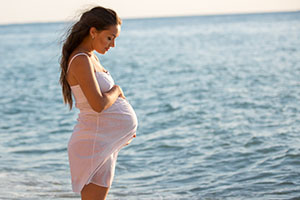The uproar regarding pregnant women visiting Zika-infected countries bolsters the opinion that travel during pregnancy is never without some risk. The fetus, the littlest traveler of all, the hitchhiker, so to speak, seemingly safely and comfortably imbedded in the uterus, is susceptible to many travel-related conditions and illnesses. Travel further complicates pregnancy by removing women by time and distance from their health care providers. Yet restricting travel during pregnancy is contrary to prevailing thinking that pregnancy is a normal phase of life and should not be overly “medicalized”.
 1. Discuss your travel plans, domestic or international, with your obstetrician. Ideally, start discussion at least a month before trips. Choose destinations where emergency medical care is readily available and arrange to carry copies of your medical records. Familiarize yourself with possible effects of prolonged sitting on airplanes (see below), visiting higher altitude destinations, exposure to excessive heat and humidity, and other vagaries of travel.
1. Discuss your travel plans, domestic or international, with your obstetrician. Ideally, start discussion at least a month before trips. Choose destinations where emergency medical care is readily available and arrange to carry copies of your medical records. Familiarize yourself with possible effects of prolonged sitting on airplanes (see below), visiting higher altitude destinations, exposure to excessive heat and humidity, and other vagaries of travel.
2. Overseas travel may present dilemmas. Immunizations recommended for specific destinations (against yellow fever, for example) can be problematic during pregnancy. The same is true regarding medications to treat malaria, altitude sickness, seasickness, and intestinal upsets.
 3. Most airlines and cruise lines have websites with detailed information for pregnant travelers. Generally, travel is discouraged or denied in the last two or three months of pregnancy. If you look “very pregnant” earlier, carry a note from your obstetrician. Security machines at airports and shipside are safe for fetuses. In flight, walking helps prevent swollen legs and possibly blood clot formation. Move your feet up and down when seatbelt signs are lit. Wear loose, non-restrictive undergarments. Ask your doctors regarding elastic stockings. Ships have medical staff trained in stabilizing basic pregnancy issues and access to telemedicine backup ashore. Seek assistance when transferring from large ships to smaller boats. Choose cruises where rough seas are unlikely as severe vomiting/diarrhea can affect the fetus.
3. Most airlines and cruise lines have websites with detailed information for pregnant travelers. Generally, travel is discouraged or denied in the last two or three months of pregnancy. If you look “very pregnant” earlier, carry a note from your obstetrician. Security machines at airports and shipside are safe for fetuses. In flight, walking helps prevent swollen legs and possibly blood clot formation. Move your feet up and down when seatbelt signs are lit. Wear loose, non-restrictive undergarments. Ask your doctors regarding elastic stockings. Ships have medical staff trained in stabilizing basic pregnancy issues and access to telemedicine backup ashore. Seek assistance when transferring from large ships to smaller boats. Choose cruises where rough seas are unlikely as severe vomiting/diarrhea can affect the fetus.
4. Travel is least likely to become problematic during the second trimester. Issues tend to arise in the first and last three months. By the second trimester (the fourth month), most future complications have surfaced or are picked up by lab and imaging testing, morning sickness is largely over, and moving about is still reasonably comfortable. In the last three months, fatigue and balance issues set in, and premature labor may occur. Every year, a handful of infants are born en route on airplanes and cruise ships.
Recently, a 28-year-old, 23-week pregnant woman passenger on a Caribbean cruise gave birth to a one-pound, five-ounce (600 grams) boy. Her obstetrician had told her that it was safe for her to travel. The ship, not equipped to handle premature infants, immediately changed course for San Juan, Puerto Rico, about 14 hours away. The infant spent several days in a San Juan hospital to be stabilized, and then was transferred by air to a better-equipped Miami hospital. He arrived home in Utah at age three months.
 5. Review your health and accident insurance policies. Many policies exclude pregnancy-related medical events occurring while traveling, particularly events occurring overseas. Exclusions include certain activities (skiing and scuba diving, for example) as well as newborn care if delivery occurs prematurely. Such care is extremely expensive. Specific travel assistance insurance (check web) may cover some pregnancy-related problems. Presently, many travel insurance companies are refusing to give refunds to pregnant women who cancel trips to countries infected with the Zika virus, even when that country is on the CDC list of countries not to visit during pregnancy. However, some airlines will give refunds. Always check hotel and air travel cancellation rules.
5. Review your health and accident insurance policies. Many policies exclude pregnancy-related medical events occurring while traveling, particularly events occurring overseas. Exclusions include certain activities (skiing and scuba diving, for example) as well as newborn care if delivery occurs prematurely. Such care is extremely expensive. Specific travel assistance insurance (check web) may cover some pregnancy-related problems. Presently, many travel insurance companies are refusing to give refunds to pregnant women who cancel trips to countries infected with the Zika virus, even when that country is on the CDC list of countries not to visit during pregnancy. However, some airlines will give refunds. Always check hotel and air travel cancellation rules.
6. Carry a medical kit. Have on hand medications you have used in recent years and are likely to need again, plus medications specific for your trip. Check that all items are compatible with being pregnant. Carrying medications minimizes buying them overseas where names and doses may be confusing. Moreover, in developing countries, medications are often counterfeited, outdated, improperly stored or otherwise adulterated.
7. Be sure you can check symptoms with health providers back home. Is your cell phone operable where you travel? Does it contain the telephone numbers of all your health care providers? Are they available 24/7?
 8. Recognize symptoms that could affect your pregnancy. Swollen legs, abdominal pain, vomiting/diarrhea, shortness of breath and weakness/dizziness, for example, are fairly common travel-related conditions, often due to air travel, bad food, altitude or hot weather. But such symptoms can also be pregnancy-related and, regardless of the cause, can affect the pregnancy. Reasonable exercise, safe food/water selections, and air conditioning help minimize these conditions.
8. Recognize symptoms that could affect your pregnancy. Swollen legs, abdominal pain, vomiting/diarrhea, shortness of breath and weakness/dizziness, for example, are fairly common travel-related conditions, often due to air travel, bad food, altitude or hot weather. But such symptoms can also be pregnancy-related and, regardless of the cause, can affect the pregnancy. Reasonable exercise, safe food/water selections, and air conditioning help minimize these conditions.
 9. Presently, the Centers for Disease Control (CDC) recommends that women who are pregnant or contemplating becoming pregnant postpone travel to areas of the world where the Zika virus is circulating. While the virus has little or no effect on the mother, it may cause catastrophic and permanent damage to the head and skull of the fetus. (For the very latest on Zika please see http://www.cdc.gov/zika/pregnancy/)
9. Presently, the Centers for Disease Control (CDC) recommends that women who are pregnant or contemplating becoming pregnant postpone travel to areas of the world where the Zika virus is circulating. While the virus has little or no effect on the mother, it may cause catastrophic and permanent damage to the head and skull of the fetus. (For the very latest on Zika please see http://www.cdc.gov/zika/pregnancy/)
10. There is no vaccine or preventative medication for Zika virus disease. The disease is acquired by being bitten by an insect infected by this virus. The proper use of an effective pregnancy-approved insect repellent is extremely important. Products containing the following active ingredients are deemed safe for use during pregnancy, says the CDC: DEET, Picaridin, Oil of Lemon Eucalyptus and IR3535. For further information on repellents, please see: http://wwwnc.cdc.gov/travel/yellowbook/2016/the-pre-travel-consultation/protection-against-mosquitoes-ticks-other-arthropods

